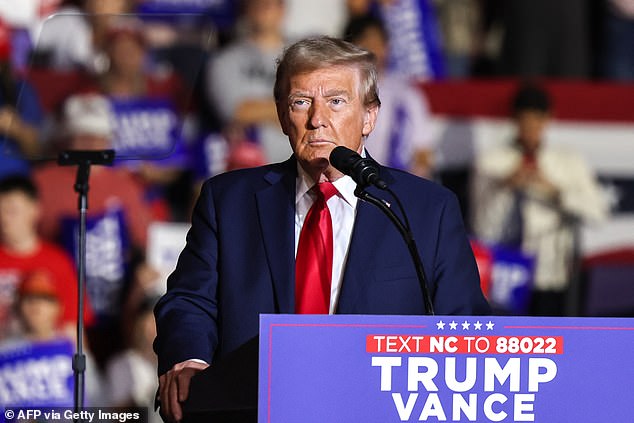Table of Contents
Markets here are understandably nervous about the budget that Chancellor Rachel Reeves will present on Wednesday.
Higher debt means higher interest rates, not just for the government but for all of us.
Higher taxes will mean less money for people to spend, as evidenced by falling consumer confidence. And companies have become less positive about growth than they were three months ago.
Globally, one would naturally expect markets to be nervous about another event that is also just a few days away: the outcome of the US election.
That’s more important for us too, not just our American cousins.
Decisive moment: Americans will go to the polls soon, and their decision will also affect UK investors
So what should we think about it?
Well, the first thing to say is that the markets have been quite calm. When it comes to stocks, volatility has been low, with the S&P500 stock index stable near its all-time high.
As for confidence in government debt, bond yields have risen in recent weeks, with 10-year Treasuries now yielding 4.2 percent, but that’s well below April’s jitters. when they touched 4.7 percent.
The dollar has strengthened a bit, and the pound has fallen from $1.34 to $1.30 over the past month, but nothing dramatic.
The next thing to keep in mind is that the odds now favor a Donald Trump victory. The American cryptocurrency trading platform, Polymarket, gave him a 64 percent chance of beating Kamala Harris.
In the UK, Betfair Exchange estimates that Trump is on the verge of a “probable victory” – a 60 per cent chance. The odds have changed in recent weeks, as Harris was slightly ahead in September, so while no one should take them too seriously (they couldn’t predict Trump’s win in 2016), there has been a clear shift in what that big companies believe will happen. .
My read is that markets think a Trump victory would ultimately be good for stock prices and bad for bonds. But they’re not too worried either.
The current positive investment climate in the United States is not as crazy as the crazy euphoria that preceded the crisis, but there are obvious fragilities.
This is a very different perspective from that of political experts on both sides, who seem to think the outcome will be vital to the future of almost everything.
People simply want to get on with their lives or, as President Calvin Coolidge said in 1925, “After all, the chief business of the American people is business.” They are deeply concerned about producing, buying, selling, investing and prospering in the world.’
That was almost 100 years ago, and a far cry from the serious pronouncements of today’s experts and think tanks. But this sentiment of “just keep going” better reflects what most ordinary Americans feel, trapped in the collective wisdom of the financial markets.
There are several ways to justify the record prices of US stocks, but the key ones are that corporate profits are strong and the labor market remains strong. As long as people can continue to invest and prosper, that’s fine.
But moods change. Calvin Coolidge’s comment occurred in the mid-Roaring Twenties, which ended in the Wall Street Crash of 1929 and the Great Depression that followed.
The current positive US investment climate is not as crazy as the crazy euphoria that preceded the crash, but there are obvious fragilities, notably the huge fiscal deficit and the danger of a resurgence of inflation. These are relevant to the UK.
We haven’t had the boom in the US stock market. Our entire market is worth less than the technology company Nvidia, which seems crazy. But if there were a sharp decline in stock prices in the United States, it would be naïve to think that we would escape harm.
More directly, if inflation rises and US Treasury yields rise to, say, 5%, it would be naïve to think that government bond yields (UK government bonds) would not rise in tandem. We have to live with the outcome of the US election, whatever the outcome.
In the short term, a Trump victory could be positive for its economy; That’s what the markets seem to think.
In the longer term, it could well be the opposite. Our job as savers and investors is to make ourselves as bulletproof as possible. Next week will be the first test of this.
DIY INVESTMENT PLATFORMS

AJ Bell

AJ Bell
Easy investing and ready-to-use portfolios

Hargreaves Lansdown

Hargreaves Lansdown
Free Fund Trading and Investment Ideas

interactive inverter

interactive inverter
Fixed fee investing from £4.99 per month

sax

sax
Get £200 back in trading fees

Trade 212

Trade 212
Free trading and no account commission
Affiliate links: If you purchase a This is Money product you may earn a commission. These offers are chosen by our editorial team as we think they are worth highlighting. This does not affect our editorial independence.
Some links in this article may be affiliate links. If you click on them, we may earn a small commission. That helps us fund This Is Money and keep it free to use. We do not write articles to promote products. We do not allow any commercial relationship to affect our editorial independence.

